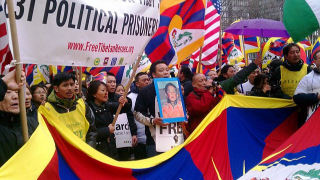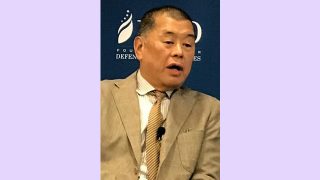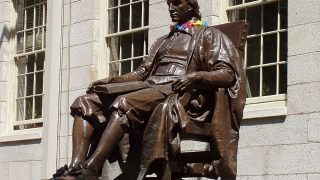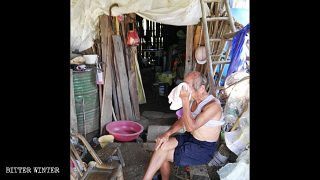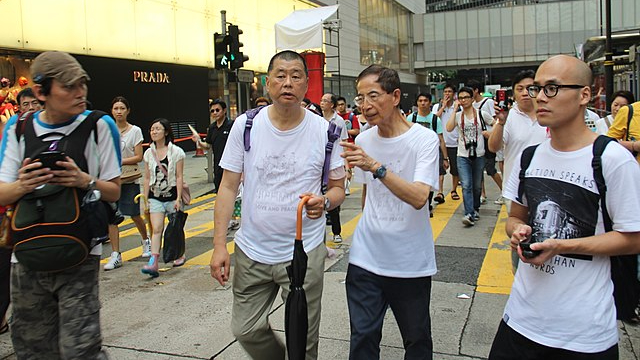
Authorities in Hong Kong will prosecute four prominent pro-democracy figures including media mogul Jimmy Lai for their involvement in a public commemoration of the Tiananmen massacre anniversary on June 4.
Lai, along with trade unionist Lee Cheuk-yan, rights lawyer Albert Ho, and veteran democracy activist Richard Tsoi will be charged with “incitement to join an illegal assembly” after thousands defied a police ban to gather in Victoria Park for the traditional candlelight vigil marking the 1989 bloodshed in Beijing.
The vigil was organized by the Hong Kong Alliance in Support of Patriotic Democratic Movements in China, which is run by Lee, Tsoi, and Ho.
Lee said he was informed of the decision to prosecute in a phone call from police on Thursday evening.
“We expected all of this,” he said in a recorded audio statement for journalists. “When you look at the overall situation in Hong Kong, the police are abusing the power to arrest and the department of justice is abusing the power to prosecute.”
Lee said the government is trying threaten the people of Hong Kong, who have thrown their support behind city-wide pro-democracy protests in the past year.
But he dismissed the charges, saying “we are exercising our right to assembly.”
The case will be heard on June 23, the Alliance said on its Facebook page.
The four already face similar charges alongside 11 other activists linked to a mass protest on Aug. 31, 2019.
“The Hong Kong Alliance believe that we have the right to mourn June 4 and have a rally to condemn the massacre,” Lee said of the peaceful vigil.
Subversion and sedition law
The decision to prosecute the four activists came as the U.K. foreign secretary said he was “deeply concerned” at China’s plan to impose a draconian subversion and sedition law on Hong Kong, bypassing the city’s Legislative Council (LegCo).
“The proposed national security law undermines the … framework under which Hong Kong is guaranteed a high degree of autonomy with executive, legislative and judicial powers,” foreign secretary Dominic Raab said in a six-monthly report on the situation in Hong Kong.
“For the Chinese government, rather than Hong Kong’s own institutions, to directly impose national security legislation would lie in direct conflict with Article 23 of Hong Kong’s Basic Law, and with China’s obligations under the Sino-British Joint Declaration,” he said, in a reference to Hong Kong’s mini-constitution and the 1984 treaty governing the 1997 handover of the city to Chinese rule.
“The law … raises the prospect of prosecution in Hong Kong for political crimes, which would undermine existing commitments to protect the rights and freedoms of the people of Hong Kong,” Raab said in a foreword to the report.
The report said the widespread protest and social unrest of the past six months were political in nature, and should be resolved by political dialogue.
While it said violence and vandalism from protesters was unacceptable, it supported public demands for an independent public enquiry into police violence, saying a recent report was “heavily criticized” because the police complaints body lacked the power to compel witnesses.
“Use of force by the police has been a major political issue, including the treatment of arrested persons,” the report said, adding that the U.K. had stopped issuing licenses for exports of crowd control equipment to Hong Kong.
Raab said his government would move ahead with plans to allow a pathway for British National Overseas (BNO) passport-holders from Hong Kong to settle in the U.K. if the national security law was implemented, and called on Beijing to “step back from the brink.”
He said London “remains deeply concerned” at the arrest of the 15 pro-democracy figures on April 18.
“The U.K. will not look the other way when it comes to the people of Hong Kong, we will stand by them, and we will live up to our responsibilities,” Raab wrote.
Officer summoned
Meanwhile, a judge in Hong Kong on Thursday summoned a traffic officer to appear in court over the shooting of a protester during a Nov. 11 demonstration, marking the first time a police officer has faced charges related to year-long protests in the city.
Pro-democracy leader Ted Hui filed five charges through a rare private prosecution against the officer in January—three of which were approved by the court, including shooting with intent to cause grievous bodily harm. If convicted, the officer faces a maximum penalty of life in prison for that charge alone.
Two other approved charges—dangerous or reckless use of firearms—each carry a maximum punishment of seven years in jail.
The officer, who was granted anonymity by a court in another case and has not been named to comply with the earlier order, had been recorded in a video which showed him drawing his weapon and firing into a crowd that surrounded him during a demonstration, hitting one protester in the abdomen. He later said he believed protesters were trying to take his gun.
According to Hong Kong law, the Department of Justice can now intervene in the case and decide whether to prosecute or terminate it.
To date, no cases have been pursued against officers relating to accusations of abuse during the police response to protests over the past year. A government report recently dismissed claims that police had used excessive force to quell demonstrations, prompting public anger.
Teacher training
Also on Thursday, the Hong Kong education bureau said teachers in the city would now be required to attend an additional 60 hours of professional training over the next three years to improve their “professional values and conduct,” prompting concerns that the authorities will soon start reshaping teaching according to the ruling Chinese Communist Party’s “patriotic education” goals for the city.
The training, which will also include a module on “local, national and international education issues” will be rolled out for newly qualified teachers, in-service teachers, and will form part of requirements for promotion, the bureau said in a June 10 circular.
Reported by Man Hoi-tsan for RFA’s Cantonese Service. Translated and edited by Luisetta Mudie.
Source: Copyright © 1998-2016, RFA. Used with the permission of Radio Free Asia, 2025 M St. NW, Suite 300, Washington DC 20036. https://www.rfa.org.
